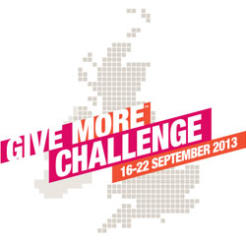Give More, the campaign designed to get people giving more time, energy and money, has launched a challenge week, trying to mobilise donors and volunteers across the country.
Give More Challenge Week, supported by companies such as UBM and charities like the Scouts, will run from 16 September, and will ask Brits to pledge to commit specific acts of giving time, money and energy. The pledges will be marked on a virtual map, which the campaign organisers hope will be covered by the end of the week.
Give More, launched early last year and backed by philanthropist Trevor Pears, has had a chequered history and has been heavily criticised for failing to reach targets. After a year in operation, the campaign – which had aimed to attract 500,000 pledges – had attracted just 15,000 signatures from members of the public promising to ‘give more’. Extended until the end of the year, the campaign has now attracted 30,000 pledges, but it aims for this number to significantly increase over this specific week.
Campaign director Tamar Ghosh spoke to civilsociety.co.uk in the summer about the progress of Give More.
“We don’t put that much emphasis on the pledge numbers. The vision for the campaign is to get as many people on the journey of giving now – at a time when we really need it – as possible,” she said.
“Pledges is the most tangible thing to count, but in some ways it’s not the most important thing because we know when we have conversations with people that haven’t given before, that you can see them starting to think about the causes they like. For them, making a pledge in a specific way is quite a long way down the journey. Although pledges are on our website, we as a team look at conversations we’ve had, meetings we’ve held, ways that we know we’ve given the message out that now is to start giving, or give a bit more if you can.
“It’s about recognising that that journey has to happen at an individual’s pace.”
The initiative is working with about 65 companies. In July, Ghosh said that the Give More had had about 79,000 conversations with individuals.
She said that while Give More would not extend beyond December, and that such a shift in giving would take a long time, the initiative still has value in setting people on a path of thinking more about their role in their communities.
Asked whether the campaign may be picked up by a new funder, Ghosh said it was in talks with various potential charity and corporate supporters. She said in particular the ‘give guide’ was a tool which the group would like to see live on in the future.
“Time will tell. If it has value, we will want to pass it on.”
Ghosh said that the campaign suffered for having been launched before the Olympics, which made it more difficult to have serious conversations about need and deprivation in UK communities.
The campaign changed messaging after the Olympics, referred to itself as a movement rather than a campaign and emphasised that it was independent of government and charities.
“We made some mistakes early on about not being clear about why this is so urgent,” said Ghosh.
"I think we’ve achieved an amazing amount of success [within a short space of time]."









